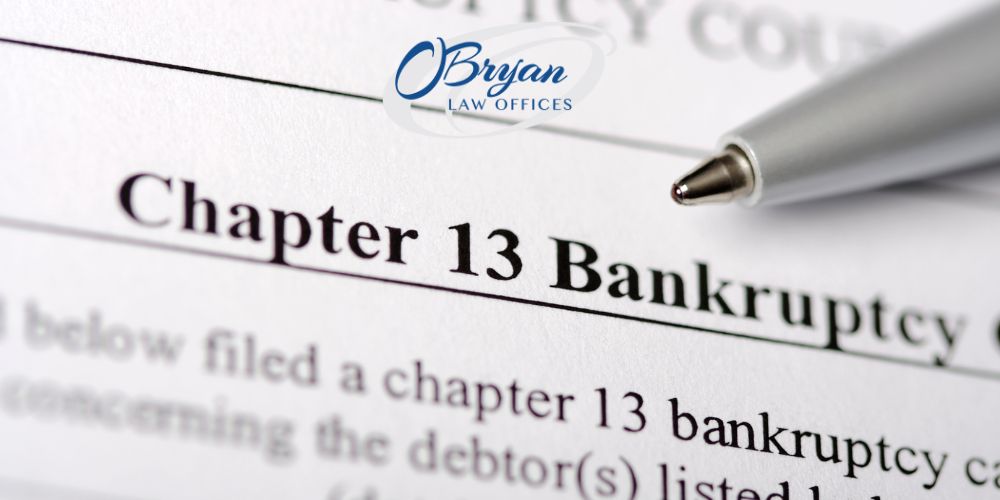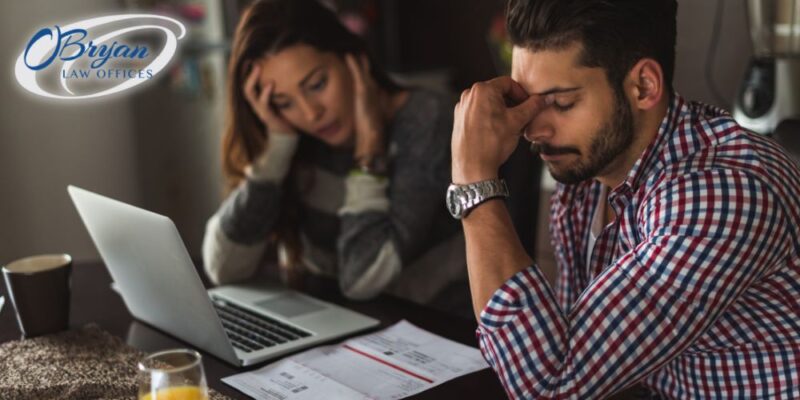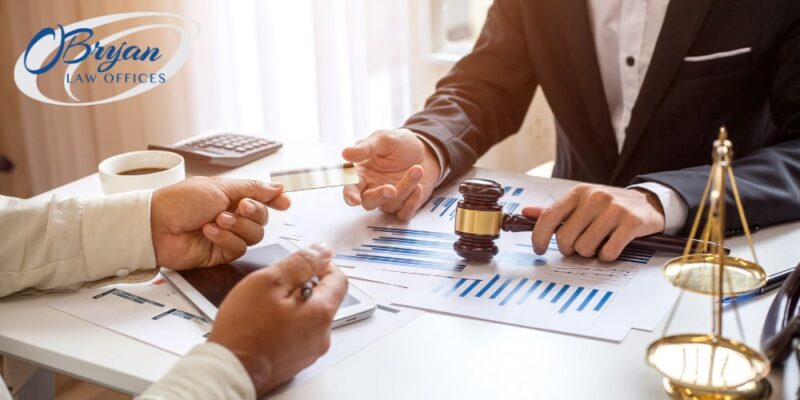Chapter 13 Bankruptcy KY

Filing Bankruptcy Chapter 13 in Kentucky or Indiana

Since the 2005 Bankruptcy Code amendments took effect, many people who might’ve otherwise filed for Chapter 7 financial protection have instead filed for Chapter 13. To qualify for Chapter 7 debt relief today, your average household income must not exceed the median in your home state. Anyone over the median income must file for relief under Chapter 13. Call 502-400-4020 to speak with an experienced Chapter 13 Bankruptcy KY attorney at O’Bryan Law Offices. Schedule a free consultation to learn more about how we can help! We also offer a Chapter 13 calculator to help you jumpstart the bankruptcy process.
What Is Chapter 13 Bankruptcy?
The Bankruptcy Code defines bankruptcy law and processes, although some areas also have local laws. It is split into “Chapters,” with six chapters in total. Determining which chapter to file revolves around the means test and the specifics of your case. The means test calculates whether or not someone makes too much money to file Chapter 7. If they cannot pass the means test, an individual filer will likely file under Chapter 13 bankruptcy.
Chapter 13 is a form of reorganization bankruptcy that assists individuals, families, and small business owners in restructuring their debt to partially or completely pay debts to their creditors. It is also known as a wage earner’s plan.
If creditor harassment, debt collection pressure, or possible mortgage foreclosure proceedings are looming, bankruptcy can give you the financial breathing room you need to get back on track.
Chapter 13 is often the best choice for people who have income and want to protect their assets or homes. This bankruptcy chapter may also be the right choice for a small business owner, rather than a Chapter 11 business bankruptcy. For some, however, a Chapter 7 bankruptcy is the best choice.
When you file Chapter 13, you agree to a debt repayment plan (or a reorganization plan) that usually involves a partial reduction in your unsecured debt, reduced interest rates on your secured debt, and extended payment terms.
This can give you the time you need to recover financially during your bankruptcy filing. You can generally keep your house, your retirement assets, your vehicles, and other personal property throughout the process.
Chapter 13 bankruptcy requires the bankrupt person or business to have a regular monthly income. That way, they can fulfill all their monthly payments in accordance with their repayment plan. Your commitment period, or Chapter 13 plan duration, is determined by comparing your total monthly income to the median family income in your home state.
Chapter 13 Personal Bankruptcy
As we mentioned before, Chapter 13 could work for both individuals and businesses, depending on the circumstances. Individual filers must meet certain requirements if they want to file Chapter 13 instead of Chapter 7. These requirements are as follows.
- The debtor’s income must be enough to cover the Chapter 13 plan payments. If they cannot afford to cover their living expenses and plan payments, they cannot file Chapter 13. This is because the bankruptcy court that handles your case will not approve a plan that the debtor cannot afford.
- The debtor can only have a certain amount of debt in Chapter 13. They may have up to $1,395,875 secured debt and $465,275 unsecured debt. If the debt burden exceeds this amount, the filer cannot go through Chapter 13. They may, however, be able to file Chapter 11 bankruptcy.
- The debtor must be either an individual person or a sole proprietorship to file Chapter 13. Small businesses and companies may not file Chapter 13. However, business owners may include personally guaranteed business debts in their payment plan.
Chapter 13 Business Bankruptcy
Chapter 13 is also an option for sole proprietorships. Again, small businesses and companies may not file Chapter 13, but there is an exception for business owners who are sole proprietors. This works because sole proprietorships are not considered separate entities like LLCs and corporations. They are an extension of the individual filer. Sole proprietors are responsible for both personal and business debts, which is why Chapter 13 is frequently a good option.
Additionally, sole proprietors may use all of their property and disposable income (both business and personal) to pay their debts. This makes Chapter 13 a more attractive option, as it gives creditors more opportunities to get paid.
Chapter 7 vs Chapter 13 Bankruptcy
There are many differences between these chapters of bankruptcy, but the most obvious one has to do with debt repayment. In a basic Chapter 7 case, the debtor will do the following within a bankruptcy court:
- A petition with all assets and debts,
- Attend a meeting with a bankruptcy trustee,
- Sell nonexempt property (if any),
- Wait to see if anyone objects to discharge, and
- Walk away from most unsecured debt immediately.
Chapter 13 debtors have to repay a portion of their unsecured debts in monthly installments over a period of three to five years. This isn’t as bad as it sounds. Most Chapter 13 plans in Kentucky and Indiana pay about 10 cents on the dollar to unsecured creditors.
The most significant benefit of Chapter 13 consumer bankruptcy is the debtor’s ability to hold on to nonexempt assets that would be subject to liquidation in a Chapter 7 case. At the completion of the repayment plan, the debtor gets a discharge on the unpaid portion of the claims.
When to File Bankruptcy Chapter 13

Most people know that bankruptcy is an option for handling their debts, but they often want to try everything they can before resorting to it. However, many so-called “debt relief” options will leave debtors worse for wear. Some examples include a debt consolidation loan, debt settlement, or other options.
The simple truth is that other debt relief options will not give you the same legal protections that bankruptcy offers. If you are struggling with debt and unsure where to turn, bankruptcy protects you from creditor harassment, foreclosure, repossession, and more. If any of the following factors apply to you, it may be time to contact an experienced bankruptcy attorney.
- You only make minimum payments on your credit cards. With such high interest rates on credit cards, making only minimum payments may result in your balance growing higher and higher each month.
- You get constant calls from creditors and debt collectors. This is one of the most stressful ways that debtors are reminded of the money they owe. However, bankruptcy will stop this harassment and all collection attempts.
- You have considered a debt consolidation loan. This seems attractive at first, as it involves consolidating all your debts into one monthly payment. However, these monthly payments have high interest rates, and your creditors are not required by law to cooperate with the debt consolidation company. Therefore, you may end up paying more than you originally owed while also landing in hot water with your creditors.
- You owe a lot more than you can afford to pay each month. Obviously, the ideal is to have enough income to cover all your monthly expenses. If you can no longer afford to do this, bankruptcy can help.
Will Filing Chapter 13 Stop Creditor Harassment?
Absolutely. Once we file your petition with the appropriate Kentucky or Indiana court, creditors must stop creditor harassment. In the days and months that follow this bankruptcy petition, bankruptcy courts will require forms and documents to move your case forward. We will provide these on your behalf and assist in fulfilling any other requirements.
As soon as we file your bankruptcy case, all secured creditors and unsecured creditors may not call you about your debt or attempt to collect on it. According to the current bankruptcy laws, these actions are illegal once the automatic stay is active.
Chapter 13 Bankruptcy KY Qualifications
The first step in filing for a Chapter 13 bankruptcy is to speak with an experienced bankruptcy attorney in your area. It is crucial to work with a local attorney, as this will ensure that you properly fill out and file any local bankruptcy documents you need.
To qualify for Chapter 13 bankruptcy, you must:
- Have regular income
- Have unsecured debt that doesn’t exceed $465,275 and unsecured debt less than $1,395,875
- Be current on tax filings
- Have not filed for Chapter 13 in the past 2 years or Chapter 7 in the past 4 years
- Have not filed a bankruptcy petition for either Chapter 7 or 13 in the previous 180 days that was dismissed
Even if you qualify for Chapter 13 bankruptcy in Kentucky or Indiana, you’ll want to make sure you understand the difference between Chapter 13 and Chapter 7 to choose which is best for your personal situation. Speaking with a bankruptcy attorney can help with this.
How to File Bankruptcy Chapter 13 in Kentucky
Once you decide that bankruptcy is the best option for your situation, contact a bankruptcy attorney with our firm. Handling a bankruptcy case alone is both difficult and stressful, but an attorney can help tremendously. Especially since the most recent bankruptcy law changes, the process has become more complicated. Your best bet is to work with a lawyer who has handled bankruptcy cases for years.
Once you hire an attorney, you must take the following steps to file bankruptcy.
- Understand your eligibility and choose the bankruptcy chapter that best fits your situation and financial affairs. To do this, we will help you complete the means test, which determines whether you qualify for Chapter 7 bankruptcy or not.
- Then, gather and fill out all necessary bankruptcy forms. Our attorneys know exactly what forms and schedules you need, including state and local forms. We will ensure your forms are properly filled out before you submit them to the bankruptcy court.
- Once your forms are complete, your attorney will submit them to the bankruptcy court. The court will review these forms and take over your bankruptcy case.
How Does Bankruptcy Chapter 13 Work?
After you file your forms and begin your bankruptcy case, the court will appoint a trustee to your case. Your Chapter 13 trustee will check your bankruptcy forms, verify the information, then work with you to develop a repayment plan.
You must then take the first of two classes: credit counseling. Credit counseling is a two-hour course that will give you the knowledge and tools you need to manage your credit and finances moving forward. This class is required for all Chapter 13 filers.
Then, your bankruptcy trustee will organize a 341 meeting of creditors. This essentially confirms that your payment plan is acceptable to your creditors. While all of your creditors will be invited, it is unlikely that any will show up.
Finally, you will begin your 3-5 year repayment plan. Do your best to remain current on these payments, as failing to do so could result in a dismissal of your case. Once you have completed your repayment plan, your remaining debts will be discharged and you will no longer be responsible for them.
How Long Does Chapter 13 Stay on Your Credit Report?
A Chapter 13 filing will stay on the consumer’s credit report for 7 years from the filing date. However, the effect that filing for Chapter 13 bankruptcy can have on your credit can actually diminish before dropping off your credit report. There are actions you can take to try and soften the impact of filing for any type of bankruptcy in Kentucky or Indiana, and a bankruptcy lawyer at O’Bryan Law Offices can help you with that.
How Long Does Bankruptcy Chapter 13 Last?
A Chapter 13 filing allows someone to keep their personal property and pay their total debt over the course of 3 to 5 years, depending on their repayment plan. The length of your repayment plan will depend on two factors: your average monthly income and how much time you need to repay your unsecured and secured debts. Additionally, the amount you need to repay depends on your disposable income, which you can figure out through the Kentucky means test.
Chapter 13 Bankruptcy KY Applicable Commitment Period
The goal for every bankrupt person or business in Chapter 13 is to repay all disposable income through an applicable commitment period. This applicable commitment period depends on the bankrupt person’s average monthly income. This period will only be three years if their income falls under the state median, or it will be five years if their income exceeds the state median.
How Often Can You File Chapter 13 Bankruptcy?
If you filed a Chapter 13 bankruptcy and want to file another Chapter 13, you must wait 2 years. Meanwhile, if you filed a Chapter 7 bankruptcy and want to file for Chapter 13, you must wait 4 years. If you’ve filed for bankruptcy before, you’ll also have to meet certain requirements before receiving your bankruptcy discharge. Our attorneys will advise you of these requirements during your free consultation.
Can Filing Chapter 13 Stop a Mortgage Foreclosure?
If you miss one or more mortgage payments due to mountains of debt, you could face mortgage defaults and even foreclosure as consequences. The good news is that a Chapter 13 filing can immediately stop a mortgage company from foreclosing your house.
Our experience and focus on bankruptcy laws allow our Chapter 13 bankruptcy KY attorneys to design repayment plans with your specific needs in mind. We will use the plan to cure a mortgage default, a car payment, and other secured or unsecured claims. The plan can also extend the payment periods for nondischargeable debts like tax debts or student loans. We analyze your cash flow and the value of your nonexempt assets to find practical ways to protect your home and possessions, all while meeting the minimal needs of your creditors on consumer debt.
Every case is different, and the bankruptcy attorneys at O’Bryan Law Offices work closely with all of our clients to make sure they’re getting the most out of their bankruptcy cases.
How a Chapter 13 Bankruptcy Lawyer Can Help

Chapter 13 bankruptcy allows you to restructure your debt by repaying certain debts over a three- to five-year period. Our lawyers will discuss whether Chapter 13 is right for you by evaluating:
- Your income and cash flow
- The makeup of your debts incurred, including both secured and unsecured debts
- Any significant assets you wish to protect, including your home, car, etc.
- Your ability to repay debt while financially recovering
The main benefits of Chapter 13 are allowing you to receive some much-needed breathing room by extending monthly payment deadlines and reducing overall amounts owed, as well as allowing you to keep your valuable possessions. Because remaining financially stable while repaying your debts is critical, we will analyze whether this is possible for you.
Strategy for Sole Proprietors or Those with Significant Assets
When you have significant assets or are a sole proprietor but have accumulated insurmountable debt, Chapter 13 bankruptcy may provide the debt relief you need.
O’Bryan Law Offices has assisted the individuals and families of Kentuckiana for the past 30 years, with our lawyers bringing a combined 50 years of service to the firm. As a family-based law firm, we utilize a collaborative, team-oriented approach. Our attorneys will guide you through the process of considering, filing for, and moving forward from Chapter 13.
Progress Towards Your Chapter 13 Bankruptcy
Throughout the three to five years of repaying your debts, we can provide guidance with any questions or concerns that arise. When you successfully complete your regular payments, we can assist you with credit restoration credit counseling. We can also help you gather and fill out all the Chapter 13 bankruptcy forms you’ll need for your case.
How Do I Know When My Chapter 13 Is Over?
Your case will be finally, officially over once you receive a Final Decree. This document should arrive around 45 days after you receive your bankruptcy discharge. The Final Decree is what officially closes your case. You are no longer involved in a bankruptcy case.
What Is the Chapter 13 Bankruptcy Discharge Process?
Before you can receive your bankruptcy discharge, you must complete your repayment plan. You must also meet the following requirements, if applicable to you.
- You have paid all child support and domestic obligations.
- You have completed your credit counseling and financial management courses.
- Then, you must verify that you have not received a Chapter 13 discharge in the past 2 years.
Once you make your final Chapter 13 payment, the bankruptcy court judge will grant your discharge. Barring very few expenses, most or all of your debts will no longer be your responsibility after you receive the discharge.
Call a Chapter 13 Bankruptcy KY Attorney Today
Debt relief through bankruptcy can feel like an overwhelming feat, but a Chapter 13 bankruptcy KY attorney can take the weight off your shoulders by guiding you through the whole process. The team at O’Bryan Law Offices is passionate about giving our clients a new financial start. For a better idea of the bankruptcy process, take a look at our bankruptcy timeline.
Call us at 502-400-4020 to arrange a free, no-obligation consultation. An experienced bankruptcy attorney at our firm can evaluate your situation, review your options, and recommend the financial strategy that is right for you.
